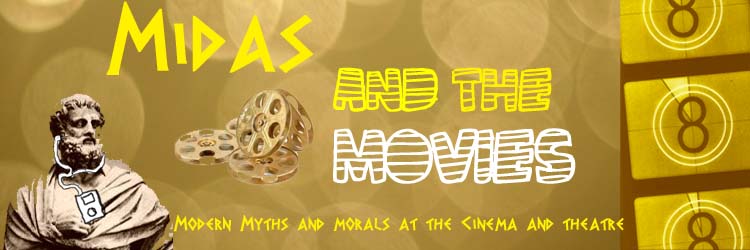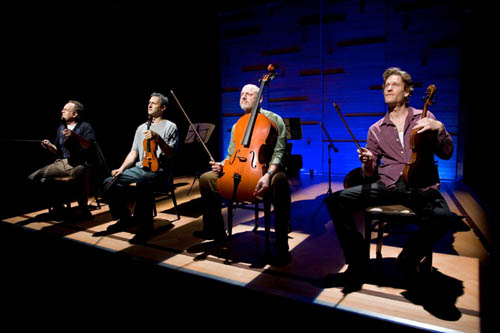11/27/09
Egyptian Theatre
Boise, ID
Marketa Irglova, alone at centerstage, introduces a song with a self-depracating reflection on the reduced showers of tour bus life. "We moight be a bit smelly," she admitted in her sweet Czech/Irish accent. "Well, I tink we're noice people anyway."
That's the kind of warm transparency that the Boise audience was treated to Friday night at the Egyptian theatre. The audience cheered as Glen Hansard and Marketa walked onstage, sat down, grinned, adjusted mics, and sang the cheery number "Fallen from the Sky." Perched on a familial-looking Persian rug, they made the audience of several hundred feel as if they were invited to a private, informal living room performance. It's a significant accomplishment, seeing as The Swell Season has garnered international fame as a result of their turn in the sleeper hit "Once", nabbing an Oscar for best original song.
Glen's full, inviting stage presence was always at the center, with Marketa providing a supporting (but nevertheless beautiful) role with her piano and harmonies. The two spent nearly equal time performing songs from their new album, and more well-known songs featured in their film. They performed with all the musicianship displayed on their albums, but they gave the crowd more than their money's worth in heart. Marketa sang with stirring tenderness, her voice like ripples in a clear pool, and Glen smiled like he was going to buy the whole audience a drink.
But a high moment of the night came when Glen ditched the band to perform a solo set. Alone with his battered acoustic guitar, the man can make magic. His voice begins gentle, and then, breathtakingly, soars up into a cathartic growl that rips through the heart. His music is tender, but muscular. He scrapes a melody from the bottom of his gut, delivering heartwrenching performances finished off with an infectious grin. This is a man pouring himself out in song, thrilled by the experience he gets to share with his audience. In the middle of the emotional "Say It To Me Now," he told a very personal story about a woman he had met who taught him to take his chances with relationships. He stepped away from the microphone, and the theatre again became the living room. He finished off his set with an epic rendition of Van Morrison's "Astral Weeks," playing with such speed and force as to imitate a drumline and a string quartet with only his acoustic guitar. The energy from his performance suffused the entire theatre, and the song drew an awed standing ovation.
Marketa and the band (Glen's Irish band, The Frames) returned to the stage for more. Marketa sang a few solo songs with a sweet vulnerability. Glen frequently invited the audience to sing along, teaching them a new refrain for each song. The songs aren’t always “catchy,” but they are haunting and affecting. At one point, Glen talked about Marketa as being his muse, “in the way that something beautiful can inspire you, like a butterfly or a bird.” Though they are no longer in a real life romance, they clearly have a great affection for one another. Their voices and personalities share a “fire and ice” relationship—the full-bodied passion of Glen, cooled by Marketa’s pure, shy vocals. They sing songs of heartache that are still romantic in tone, like “When Your Mind’s Made Up” and Oscar-Winner “Falling Slowly.”
Glen and Marketa’s warmth toward one another warms the audience to them. They shared many stories about the nice ‘Tanksgiving’ they were treated to the day before, and of how grateful they were. They engaged their hushed audience in more than mindless stage banter—they shared their stories, their real selves. At the end of the night, we had been treated to more than great music. It felt as if we had spent a long, homey dinner with our favorite friends. A night with The Swell Season is a night in a their living room, no matter how big the venue.





